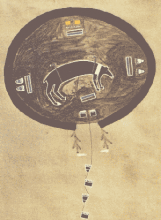Article
The Mountain Way, or the Mountain Chant, refers to a Navajo ceremony, performed by a singer or medicine man (called a hataałii in Navajo), that is performed to address mental uneasiness and nervousness (Reichardt 12).The Mountain Way, similar to other Navajo ceremonials, address individual unease in addition to antisocial tendencies, thereby bringing the group that participates in the ceremonial, including patients and their extended families, into an harmonial accord, or balance (Kluckhohn 169)
Navajo cures are targeted at body, mind, and spirit, calling on the patient, his kin, singer, and divine people to restore his harmony with the world. Before a singer, or medicine man (they are seldom women), is called, a hand trembler, or ndilniihii (often a woman), will diagnose the source of illness. Through prayer, concentration, and sprinkling of sacred pollen, her hand will tremble and pinpoint the cause, which then determines the proper ceremonial cure. Then a medicine man, or hataałii, meaning "singer," who knows the proper ceremony is called and preparations are set in motion.
There are nearly 100 Navajo chants of varying range and intricacy. Originating from the Creation Story, they are so nuanced and complex that a medicine man learns only one or two ways over many years of apprenticeship. Ceremonies last anywhere from one to nine days (the Mountain Way Chant lasts nine days) and include chants, songs, prayers, lectures, dances, sweat baths, prayer sticks, and sand paintings. In order for a ceremony to be effective, everything must be done as prescribed in the legends.
"First of the sand paintings, Frighten Him On It or Pĭké̆hodĭklad (Navajo), employed in the Mountain Chant, circa 1907" by E.S. Curtis is licensed under Public Domain.
Manuscripts
References
Kluckohn, Clyde
1946 The Navajo. Cambridge: Harvard University Press.
Matthews, Washington
1997 [1887] The Mountain Chant: a Navajo ceremony. Salt Lake City: University of Utah Press.
Reichard, Gladys Amanda
1950 Navaho Religion: A Study of Symbolism. New York: Bollinger Foundation.

